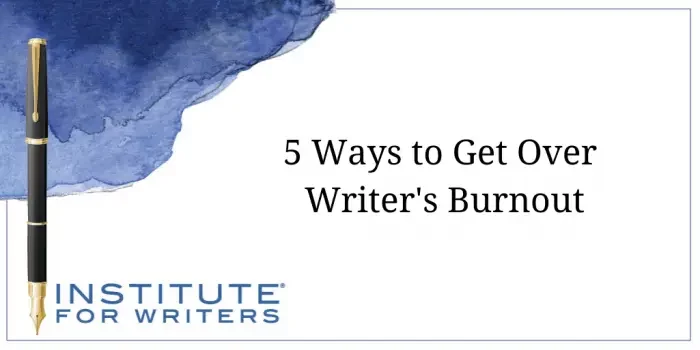1000 N. West Street #1200, Wilmington, DE 19801
© 2024 Direct Learning Systems, Inc. All rights reserved.

We teach our students how to write and get published!
View our Course Catalog >
Being a writer for a living is a funny thing. Unlike a lot of other jobs, writing comes down solely to you, and to your own mind. If you’re broken in any way, whether that be a true medical illness or just a really bad cold, your writing is also broken. And unlike a lot of jobs, where you can get someone to cover your shift, or take a day off to recover, or even call for some other type of assistance, no one can help you as a writer.
It’s just you, yourself, and you. And if you’re the one struggling to get your work done, you’re also the one that has to help make it better. So, on those days that you just aren’t feeling it, or are suffering the dreaded writer’s block, burnout, or general malaise of being someone who sits alone and types to a screen all day, here are some tried-and-true solutions to get you through.
1. Don’t try to power your way through.
I’ve done this, and I’m sure plenty of other writers have done it too, but let us assure you that it’s never a good idea. It’s far more productive to take a 10-minute power break if you just can’t focus than it is to force yourself to sit for an hour and produce pure gibberish.
2. Log off social media.
We’ve all had those days when we’re feeling aimless, so we check social media for a “quick break,” then before we realize it, two hours have gone by and we feel even more miserable knowing that we just wasted so much time doing absolutely nothing.
Jaimie Seaton, 53, a former Newsweek foreign correspondent from New England explains how, after working as a freelance journalist for over 20 years, still faces periods where she just can’t write. And in those times, she has learned to unplug and leave the digital world for a few days until she is recharged. “This happened when I had to write a very personal essay for BuzzFeed,” she says. “I went off of social media and left the essay for a few days, and then wrote it very slowly. If nothing is coming, if I can, I leave the work and do other stuff to charge my batteries.”
3. Stop the cycle before it gets worse.
Nikki Haverstock, 40, is an author from Durango, Colorado who has published 12 paranormal mysteries. She points out that she often notices that when the first inkling of burnout rears its ugly head, she reacts by trying to cut out of all her other activities. Anything from hobbies, to seeing friends, going on family outings, prepping meals, reading, or watching TV all get cut in the effort to “buckle down.”
The only problem? All that buckling down only serves to make the burnout worse. Nikki explains that it can be difficult to see the pattern repeating itself until she becomes even less productive. But when she takes the time to evaluate why her writing is suffering, she is able to clear time to do some of the things she loves, which then serves her by giving her renewed energy and ideas to boost her writing.
4. Understand that some things are out of your control.
Not all burnout is a personal choice. Kate Wehr, a 34-year-old writer from Montana explains that she was forced to shut down her entire writing career, including her website and even email, after she had four children in less than two years. Her timeout caused her a lot of stress, but knowing it was temporary helped her to cope. “I’m just starting to try to revive things, really,” she adds.
5. Surrender to the ebbs and flows.
Writing is a creative art, as much as it is a technical skill. And because it demands so much of our creative selves, it also demands to be respected for its creative ebbs and flows. As a writer but also a mom of four who has bills to pay, I have spent a lot of time fighting off the inevitable ebbs I have faced in my craft, but I’m starting to realize more and more, that fighting it never pays off as much as respecting it.
Shannon Lee, from Washington, D.C., is a 42-year-old storyteller and contributor at Forbes, The Lily at the Washington Post, and Washington Business Journal. Shannon also notes that she has learned to fight burnout by giving in to her creative ebbs and flows. “I respect my need for downtime or a diversion,” she explains. “In the past, I’ve switched to a music or film project for a few months. Sometimes, I find switching my niche or genre helps cultivate inspiration.”
Chaunie Brusie is a labor and delivery nurse turned writer. She lives in Michigan with her husband, four young kids, and a flock of chickens. Find her at chauniebrusie.com.
1000 N. West Street #1200, Wilmington, DE 19801
© 2024 Direct Learning Systems, Inc. All rights reserved.
1000 N. West Street #1200, Wilmington, DE 19801
© 2024 Direct Learning Systems, Inc. All rights reserved.
1000 N. West Street #1200, Wilmington, DE 19801
© 2024 Direct Learning Systems, Inc. All rights reserved.